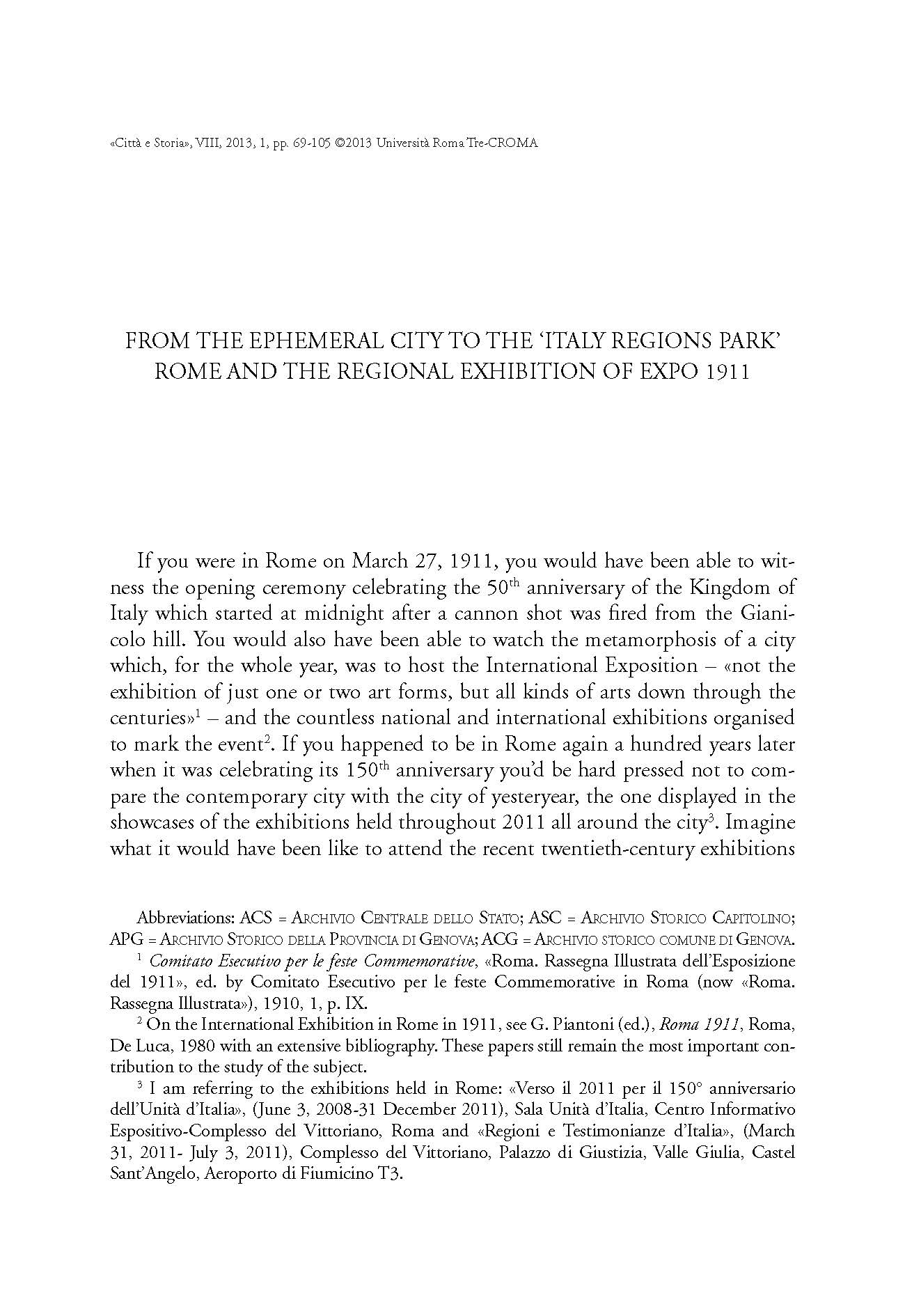From the Ephemeral City to the ‘Italy Regions Park’: Rome and the Regional Exhibition of Expo 1911
6,00 €
One can’t help wondering what Il volto di Roma – or at least part of it – would have looked like if these regional pavilions, these ephemeral wood, chalk and papier-mâché structures had been converted into brick and stone buildings. What would the city have looked like beyond the Risorgimento bridge if the «Regional Park» project had actually been implemented? Indeed, back in 1911 someone did imagine trying to change it from ephemeral to permanent. The dream involved incorporating the small papier-mâché city (which had grown almost out of nowhere) into the real city – just like the medieval village in Turin designed in 1884 by Alfredo d’Andrade. The idea was to consolidate and preserve the pavilions and make the Regional Exhibition permanent, creating a «City of Regions», in other words a «Regional Park» in the capital. We are familiar with most of the countless and remarkable urban and architectural changes made in Rome for the International Exposition: the inauguration of the Victorio Emanuele II monument designed by Sacconi, the construction of the Flaminio stadium, the Palazzo dell’Arte by Cesare Bazzani, the Flaminio bridge, the renovation of Diocletian’s Baths, and Castel Sant’Angelo. Less well-known are the pavilions designed for the Regional Exhibition in Piazza d’Armi planned as a retrospective exhibition of Italian art celebrating the artistic and architectural past of Italian regions. However, this particular event has never been studied in depth. In particular, the project for its consolidation – promoted by Mayor Ernesto Nathan and designed by Marcello Piacentini – was never published. The two promoters wanted to «build a permanent exhibition […]representing the regions and create new and more evolved corporations to show the whole world the wonderful artistic and industrial skills of Italian regions».
One can’t help wondering what Il volto di Roma – or at least part of it – would have looked like if these regional pavilions, these ephemeral wood, chalk and papier-mâché structures had been converted into brick and stone buildings. What would the city have looked like beyond the Risorgimento bridge if the «Regional Park» project had actually been implemented? Indeed, back in 1911 someone did imagine trying to change it from ephemeral to permanent. The dream involved incorporating the small papier-mâché city (which had grown almost out of nowhere) into the real city – just like the medieval village in Turin designed in 1884 by Alfredo d’Andrade. The idea was to consolidate and preserve the pavilions and make the Regional Exhibition permanent, creating a «City of Regions», in other words a «Regional Park» in the capital. We are familiar with most of the countless and remarkable urban and architectural changes made in Rome for the International Exposition: the inauguration of the Victorio Emanuele II monument designed by Sacconi, the construction of the Flaminio stadium, the Palazzo dell’Arte by Cesare Bazzani, the Flaminio bridge, the renovation of Diocletian’s Baths, and Castel Sant’Angelo. Less well-known are the pavilions designed for the Regional Exhibition in Piazza d’Armi planned as a retrospective exhibition of Italian art celebrating the artistic and architectural past of Italian regions. However, this particular event has never been studied in depth. In particular, the project for its consolidation – promoted by Mayor Ernesto Nathan and designed by Marcello Piacentini – was never published. The two promoters wanted to «build a permanent exhibition […]representing the regions and create new and more evolved corporations to show the whole world the wonderful artistic and industrial skills of Italian regions».

